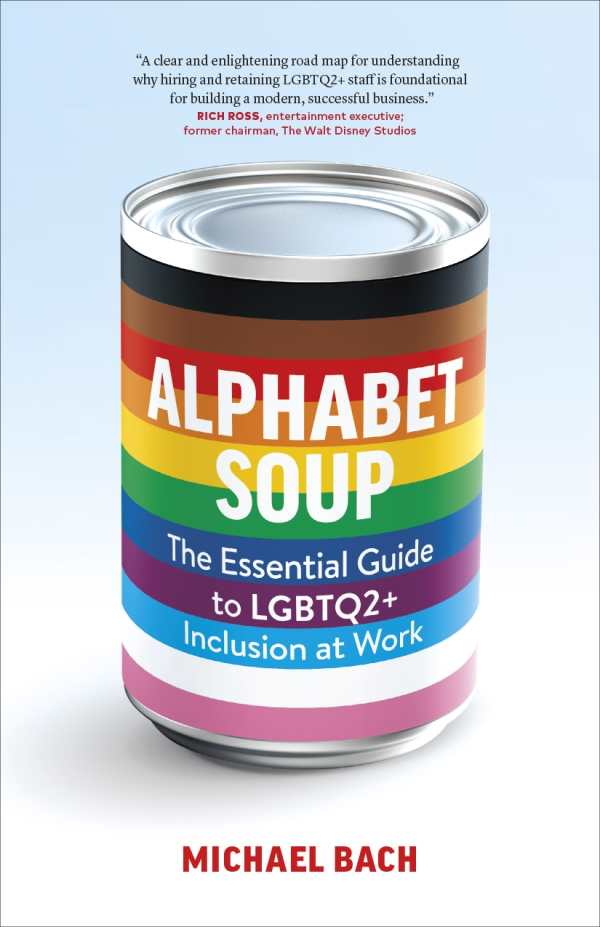Alphabet Soup
The Essential Guide to LGBTQ2+ Inclusion at Work
Alphabet Soup is an educational, inviting guide to becoming an advocate for LGBTQ2+ inclusion at work.
Michael Bach’s Alphabet Soup is a snappy, useful guide to ensuring that organizational policies include LGBTQ2+ employees.
Part educational handbook and part toolkit, Alphabet Soup lists important milestones in LGBTQ2+ history in order to demonstrate why inclusion in the workplace is imperative. It notes that, rather than being a thing of the past, homophobia and transphobia remain prevalent worldwide, with seventy-one countries still criminalizing non-straight, non-cisgender identities. Further, thousands of related hate crimes are committed in the US and Canada each year. Organizational policies, Bach argues, may contribute to environments that are, if not dangerous, still hostile to queer people.
Terminology shifts according to time period and location, and hence Bach spends one chapter breaking down acronyms, and another dissecting the many facets of gender and sexuality. Bach, a Canadian, nods to Indigenous identities with the inclusion of the “2” in the LGBTQ2+ acronym to indicate Two-Spirit people, though this identity is less often noted in US versions of the acronym. As the book acknowledges that terminology fluctuates, it encourages its audience to stay current with the terms that individuals and communities prefer.
Bach also shares some of his life story, demonstrating the importance of inclusion by revealing how long he lived under the belief that who he was, as a gay man, was a bad thing, and something to hide. The book builds its case on much more than personal anecdotes, however: Bach’s expertise as someone with decades of work experience in diversity and inclusion shines through, ensuring that his recommendations are well-informed and backed up by evidence.
The book’s chapters explain the meaning and importance of safe spaces, along with measures to attract and retain LGBTQ2+ people within organizations. Measuring demographic information in ways that are accurate, useful, and non-invasive gets its own chapter, while marketing to LGBTQ2+ people, in pursuit of the so-called “pink dollar,” is also addressed. The book ends with a compelling rallying cry for straight, cisgender people to become active allies, rather than just congratulating themselves on not being homophobic.
Written in an accessible tone and with snarky and humorous asides, the book presents evidence that queer people are a large enough part of the population (between seven and ten percent, according to some estimates) to not only be deserving of basic human rights, but also of workplace inclusion. It argues that inclusion benefits not only individuals but entire companies, schools, and religious institutions, which also can make existing members feel welcome while bringing in fresh talent. The sensible suggestions include changing terms like maternity leave to parental leave, and having a zero-tolerance policy for homophobic and transphobic incidents at work.
Alphabet Soup is an educational, inviting guide to becoming an advocate for LGBTQ2+ inclusion at work and in other organizational spaces.
Reviewed by
Jeana Jorgensen
Disclosure: This article is not an endorsement, but a review. The publisher of this book provided free copies of the book and paid a small fee to have their book reviewed by a professional reviewer. Foreword Reviews and Clarion Reviews make no guarantee that the publisher will receive a positive review. Foreword Magazine, Inc. is disclosing this in accordance with the Federal Trade Commission’s 16 CFR, Part 255.


